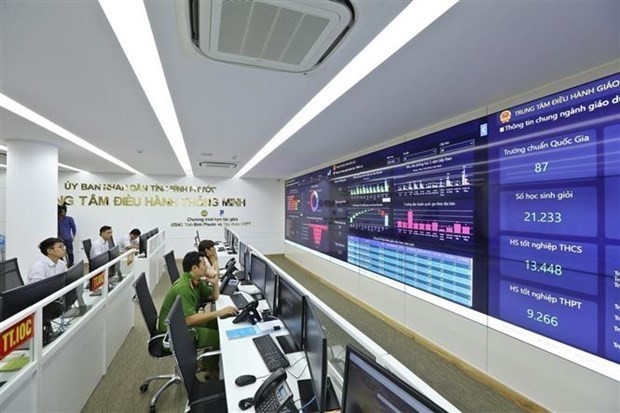
Vietnam adopts synchronous global integration strategy
Latest
 |
| At a smart operating centre in Binh Phuoc.(Photo: VNA) |
Speaking at the event, Deputy Head of the Foreign Ministry’s Foreign Policy Department Dinh Nho Hung said as a majority of countries have re-opened the door and normalised exchanges in various areas, five major trends are under attention, including the fourth industrial revolution, digital transformation, green transition, climate change adaptation, rearrangement of supply chain, and labour change.
In Vietnam, the trend of shifting to green economy and digital transformation has opened up opportunities to change growth model on the back of rearranged supply chains, improved logistics capacity, innovation, human resources and quality FDI.
Vietnam’s GDP growth in the first half of this year, at 6.42%, surpassed the level set in the best scenario and is equivalent to the pre-pandemic average. The GDP growth in the second quarter was estimated at 7.72% year-on-year, a record since 2011. Export-import hit 371.4 billion USD, up 16.4% annually, of which export rose by 17.3% to 186 billion USD. International arrivals reached nearly 602,000, marking a 6.8-fold increase from the same period last year.
Hung said the 13th National Party Congress set orientations to conducting synchronous, creative and effective external activities with the effective use of domestic and foreign resources.
Lam Thi Quynh Anh from the Office of the Inter-agency Steering Committee for International Economic Integration under the Ministry of Industry and Trade said Vietnam's policy aims for comprehensive global integration in three pillars, namely economy; politics and national defence-security; socio-culture, sci-tech and education, with economic integration as a focus.
International integration should be promoted synchronously across the fields under an overall strategy with a roapmap and steps suitable with reality and the country's capacity, she said.
According to Anh, businesses have the responsibility for effectively implementing free trade agreements (FTAs), grasping commitments in FTAs and markets of FTA member states. She urged them to improve competitiveness in terms of adopting technical standards and follow regulations of partner markets.
Director of the Vietnam Chamber of Commerce and Industry’s WTO and Integration Centre gave notices to the export of Vietnamese farm produce in the context of new-generation FTAs.





















